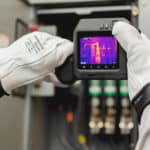NFPA 70E Qualified Person Electrical Safety Training
2024 NFPA 70E | Arc Flash Safety
Training duration: 2 days
This 2-day course covers all the requirements a Qualified Person needs to know, including OSHA and NFPA 70E 2024 electrical safe work practices. The detailed course material is for all personnel working on, around, or near any electrically energized equipment. Topics discussed include:
- The differences between the 2021 and 2024 NFPA 70E standard editions.
- Standards for electrical safety
- Electrical fundamentals
- Qualified person requirements
- Risk assessment, approach boundaries, and clearance distance
- Electrical hazards
- The safe installation of electrical equipment
- Proper electrical work practices and procedures
- The interconnection between NFPA 70E and NFPA 70B
The new NFPA 70E 2024 requirements, rules, and regulations will be discussed as required by the OSHA Electrical Safety Related Work Practices Standard 1910.331-1910.335. The primary goal of this course is to keep electrical workers safe, updated, and equip them with lifesaving knowledge.
* Please note this program contains graphic material.
Training outline
Hazard risk assessment
- Arc flash hazard assessment
- Incident energy analysis
- Arc flash boundaries
- Approach boundaries for shock protection
- Clearance distances
- Equipment labeling
Standards for electrical safety
- OSHA
- Code of federal regulations 1910.331 335
- NFPA 70E standard for electrical safety in the workplace, 2024 edition
- Workplace safety programs
Reducing electrical hazards
- Fuses
- Circuit breakers
- Guarding
- Grounding
- GFCI
Electrical fundamentals
- Understanding electricity
- Conductors/Insulators
- Shock safe and unsafe current values
Personal protective equipment (PPE)
- Arc-rated clothing
- Hazard risk categories
- Voltage-rated gloves and tools
Work involving electrical hazards
- Justification
- Permits
- Exemptions
Meter safety
- Selection and use
- Category rating
NIOSH case studies
- Fatality assessment
- Attitudes, emotions, and conditions
Energy control program
- Lockout/Tagout
Let’s work together to create a safer, more reliable world.
To learn more about this course, or any of our training programs, please fill out the form on this page or call us 866.772.6770.





